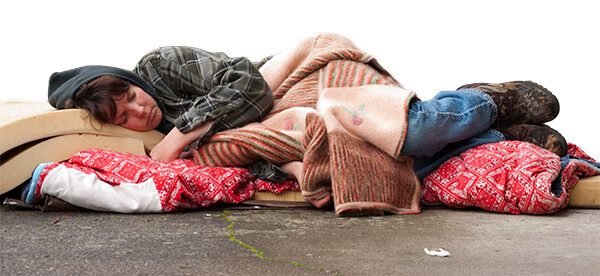
‘The Darkest Night’: remembering the homeless
By C. Anthony Hunt*
On Dec. 20, the Rev. C. Anthony Hunt of Epworth Chapel UMC in Baltimore preached at Baltimore City’s Memorial Service for the homeless men and women who died in 2015. Below are excerpts from his remarks.
On this first night of winter, one of the longest, coldest nights of the year, we gather in solidarity with and for those in our city, state, nation and world who are forced to endure the night. We gather to remember those who in this year and in years past have died while enduring the night.
The night. By its very nature, the night is supposed to be a point and place of rest and respite from the work of the day. The night is meant to be a place of peace and quiet and tranquility from day-time’s hustle and bustle.
But for far too many of our sisters and brothers, the night is a place of prolonged agony and despair. The night is a place of dark want and desperate need, of painful isolation and luminous want. For many, far too many persons in our city and our state, the night is their home, the place where they are forced to lay their heads and wonder with seemingly perpetual dismay: how long the night will be, and if the day will ever come for them.
Elie Weisel, in his book entitled, “Night,” depicts night as embodying, in its most hopeful dimension, a transition from darkness to light, filled with the promise of the beginning of a new day. But Weisel wants us to see that there is too often a certain tragic irony and finality of the night that results in everything coming to an end.
In “Night,” Weisel said, “I wanted to show the end, the finality of the event. Everything came to an end — man, history, life and meaning. There was nothing left.” This is the fate of too many of our homeless sisters and brothers in Baltimore.
As we gather this evening in Baltimore, the largest city in the wealthiest state in America, we gather amidst the very real contradictions of wealth and poverty, abundance and scarcity, among us.
These contradictions affect every aspect of our lives together. Homelessness — the plight of the unhoused and housing insecurity — is related to scarcities that are found in lack all around us: inadequate healthcare and malnutrition, under-education, under and unemployment, and safety for the poorest among us.
In Baltimore, the fifth most violent city in the nation, much of our attention continues to be focused on the gun violence and gang violence in our midst. But, Mohandas K. Gandhi intimated years ago that “Poverty is the worst form of violence.” It is incumbent upon us who are concerned about the plight of our unhoused, homeless neighbors to see homelessness as, in and of itself, inflicting violence upon its victims — violence on the souls and dignity of homeless persons, violence which affects their physical well-being and threatens their lives, violence which impacts potential and possibility of individuals and society as a whole.
It is incumbent upon those who are charged with establishing policy and setting political agendas, to see the moral implications of homelessness.
Some of what underlies our will to such violence, and our inability or unwillingness to house all of the homeless among us, are the very real and deep racial and class divides that exist among us. Ta-Nehisi Coates, in his book, “Between the World and Me,” writes about growing up on the streets of Baltimore, and states that “race is the child of racism, not the father.” I’d add that class is the child of classism, not the mother.
The twin evils of racism and classism serve as severe detriments to bringing about wholeness for those among us who find themselves living on the margins of our city.
In his book, “Jesus and the Disinherited,” Howard Thurman asks a haunting question (especially) for persons of faith: “What does Jesus of Nazareth have to say to those who have their backs against the wall?”
What does God — the divine — have to say about the way the poor among us are treated?
In Matthew 25, Jesus says, “… for I was hungry and you gave me food, I was thirsty and you gave me something to drink, I was a stranger and you welcomed me, I was naked and you gave me clothing, I was sick and you took care of me, I was in prison and you visited me… and Truly I tell you, just as you did it to one of the least of these, you did it to me.”
Our divine and moral prerogative is to speak out and act out — individually and as a society — with and for our neighbors. To speak out and act out in compassion and justice. To speak out and act out in ways that address the immediate needs of God’s people who must endure the night — those on our city’s margins — by providing shelter and food and clothing and healthcare while also addressing the serious systemic political, economic, moral questions as to why our sisters and brothers are forced to endure the night in the first place.
I was grateful for the opportunity to be part of this journey and am appreciative for the experience. My ministry has not been the same since.
*The Rev. C. Anthony Hunt is the pastor of Epworth Chapel UMC in Baltimore.
